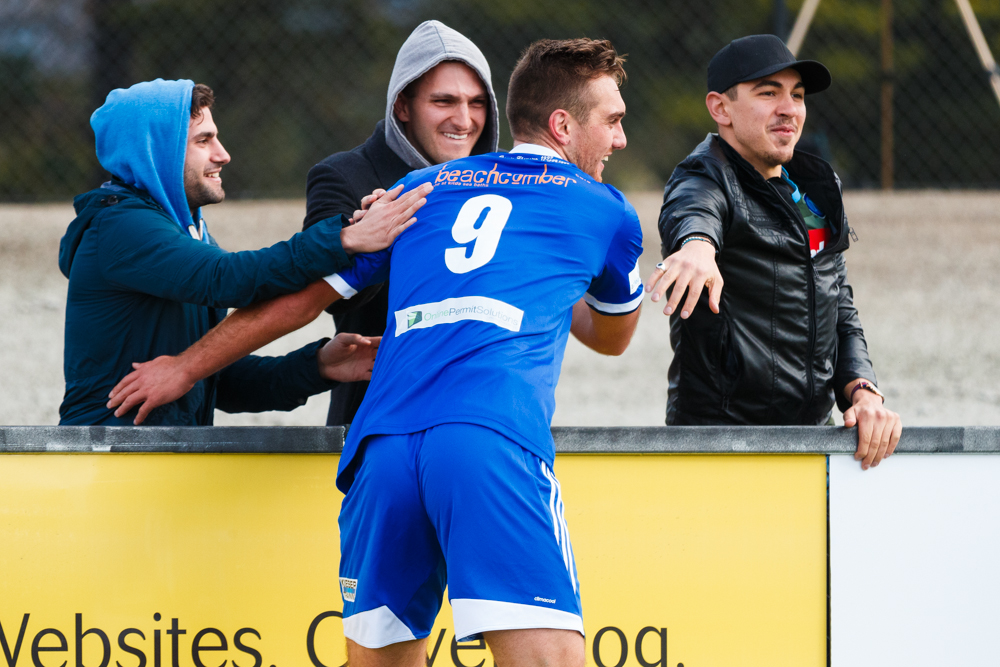With two Victorian Championships, two Golden Boots and a NPL Player of the Season award next to his name, Milos Lujic’s CV reads more like someone coming to the close of an illustrious career. Given all his achievements, it can be easy to forget that the imposing striker is still only 25-years-old.
The Australian Institute of Sport (AIS) graduate went from scoring the goal that saved his senior side from relegation as a 16-year-old, before going on to represent the Young Socceroos. Whilst injuries, unsuccessful trials in Europe and a lack of regular football stalled his progress, his move back to the second tier of state league football regenerated his career and the number nine has gone from strength to strength since then, becoming one of the most recognisable names at South Melbourne today.
The beginning
The round ball game was ingrained in Lujic as a youngster growing up in suburban Melbourne in the 1990s. His father Zdravko was a legend at NSL side Footscray JUST, playing 241 games over a ten year period in the 1980s whilst also representing the Socceroos during the Frank Arok era.
“My family is and always has been a football family, as my father put a soccer ball into me and my sibling’s arms ever since we were born,” Lujic explains.
“He would take us down to training every Sunday, so he has always been a big influence on us being a football family.”
Lujic’s junior career saw him start off at Springvale White Eagles, followed by stints at Knox City and future senior employers South Melbourne. Growing up as a die-hard Arsenal fan, his junior idol was Thierry Henry and just like the Frenchman, Milos made a habit for himself of scoring goals with ease in his junior days.
Early potential
So impressive was a young Lujic that in 2006, as a 16-year-old, he was handed his senior debut for the Bentleigh Greens in the second tier of state league football. Despite his tender age, Lujic would go onto have a telling impact, scoring the equaliser against Northcote City to save the Greens from relegation.
His form would not go unnoticed by the Victorian Institute of Sport (VIS), who picked him up for a short time before the AIS came calling. Lujic spent 2007 at the institute, which at that time competed in the Victorian Premier League. Along with the likes of future Socceroos James Holland, Luke Devere and Daniel Mullen, the young striker impressed with six goals in 25 games to help earn his side a respectable mid-table finish.
“It was a really good year for me in terms of my football development where I learnt a lot under coach Steve O’Connor,” Lujic reflects.
Some of his other teammates at the AIS the included current South teammates Bonel Obradovic, Matthew Theodore and Dane Milovanovic, with Lujic adding, “it’s funny how the football community all gets around like that and I’m still friends with all those boys from that year”.
His good form saw him earn a call up to the Young Socceroos squad. The then 17-year-old seemingly had the world at his feet towards the back end of 2007.
However, an injury sustained during Young Socceroos duty saw Lujic return to Melbourne and sign for the ambitious Oakleigh Cannons as – admittedly – “an injured player”. A six-month lay-off during the off-season saw Lujic struggle to earn a starting berth in John Anastasiadis’ talented outfit. That, along with being the youngest in the squad, didn’t help his chances. With the upcoming Under-20 FIFA World Cup on the horizon, Lujic sought regular first team game time. In order to fulfil this objective, he moved to fellow VPL side Richmond, where he also had a stint in Melbourne Victory’s youth team.
My Football Journey: John Anastasiadis
Melbourne Victory Youth
Selected in the inaugural Victory Youth squad for the 2008/09 season, Lujic played just four times (scoring once) for Mehmet Durakovic’s youngsters before departing the club. At the time, many youngsters failed to break into the senior squad, especially at Victory, whounder Ernie Merrick were on their way to winning their second A-League Championship. Lujic cites this as a factor contributing to his eventual departure.
“Mehmet was great towards me but I did not see many of the youth boys getting a call up into the senior team, with not many of us being invited to train with the seniors. Given that I was in the Australian youth-set up at the time, I thought it was a little unfair that I was not getting called up to train with the senior squad,” Lujic recalls.
He was then offered the chance to go overseas to trial, which he accepted, citing the lack of opportunity to break into the first team as his main reasoning behind the decision. Despite this, Lujic holds no ill-feelings towards Merrick, Durakovic and Victory, adding that “it was a good experience and a learning curve for me”.
Overseas trials and return
Unsuccessful trials with Belgian side Charleroi and Serbian giants Partizan Belgrade followed, before another injury saw him spend a further six months in rehabilitation. “During those crucial stages of development [18 and 19], I was on and off with injuries at the time and thus it was a difficult period for me,” Lujic reflects. His injury setbacks would ultimately cost Lujic a chance to represent the Young Socceroos at the 2009 FIFA Under-20 World Cup in Egypt.
Lujic returned to the Victorian state leagues in search of game time, joining a talented Richmond side led by Michael Chatzitrifonos. It ended up being his most successful year results wise, finishing the regular season on top of the table. However, the AIS graduate still found himself playing second fiddle to in-form striker pair Jesse Krncevic and Daniel Visevic. “It was a funny year because the team was doing so well that it was hard for me to break into the starting eleven,” Lujic recalls. “Even when I did come on and score a few winners in consecutive weeks, Chatz would take me aside and say that although he wanted to give me a start, it was hard to change a winning team.” Despite his reduced role in the side, Lujic asserts that “the whole team was on fire,” and was happy with his time at the club.
His next club was junior side Springvale White Eagles, a move that was meant to herald a fresh start and more minutes for the striker. However, the experience quickly turned sour, with the club struggling on and off the field.
“The coaching staff under Zed [Zlatko Mihajlovic] and the club hierarchy weren’t seeing eye to eye on a few factors and that made things hard for us,” the striker admits on his spell at White Eagles.
A return of three goals in 19 starts for the strugglers had such an adverse impact on Lujic that he considered calling time on his career at the age of 21.

